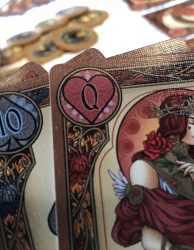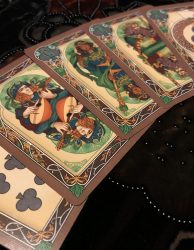
No Pain, No Game
by Angel Leigh McCoy …
The games industry is unlike any other I’ve ever worked in. There are unspoken laws of quality, teamwork, and dedication that drive a studio. Although the studio may not ask you to, most game developers work more than 40 hours a week, often late into the night and on weekends—because they care so much about doing a good job. This is the competition you’re up against when you attempt to launch a career in game development.
Game development is an affair of the heart.
It’s about passion. Passion for storytelling. Passion for creativity. Passion for programming. Passion for game design. Passion for community.
That’s the core of indie game design as well. These are the people who love what they do so much that they’re willing to work on side projects for little to no pay. Of course, there are other perks, such as improving skills and learning new ones, networking, creating showcase pieces for your portfolio and résumée, unfettered creativity, small-team dynamic, and working on your own I.P.
Time and again, I’ve seen people rise from the QA contractor pool into full-time employees working as writers, game designers, scripters, programmers, artists, the whole shebang. They managed to do this because they showed their passion and they honed their skills on their own time.
Working in the games industry is stressful, terrifying, and difficult. You have to be smart, and you have to be resilient. You’ll face crushing deadlines and ruthless feedback. You’ll tackle the most gnarly puzzles and solve them (usually). You’ll tangle with fellow creatives, all of whom have their own vision, and you’ll wrangle them into a team that shares one single vision. Every day in the games industry is an adventure. Every day is a challenge.
What about the loot and achievements you earn at your job (salary and cred)? Well, let’s just say, they’re not bad. But, they’re not enough to make it all worth it. What is enough is the opportunity to collaborate with crazy geniuses who have vibrant energy and geeky interests. What is enough is the opportunity to put your talents and skills toward a product that will make so many people happy. What IS enough is seeing your creation take on a life of its own in the hands of its fans.
That is all I need.



